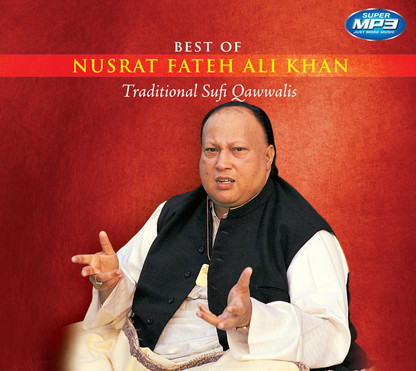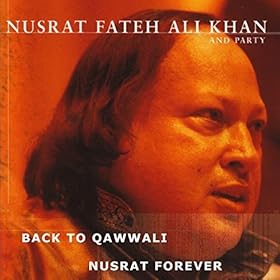

Rare footage of Michael Brook in studio with Nusrat Fateh Ali Khan. And I think he had more creative input into the second album, just because he was more aware of the options. So the whole process was quite different. In the interim between the two albums, Nusrat had done some work with other people, and also from our time working on Mustt Mustt, he became more familiar with modern studio techniques like overdubbing, layering, editing and all that kind of stuff. I think when we did Mustt Mustt, most of Nusrat's experience in a studio had been an archival experience, where you did a performance in real time, and that was it. The process was significantly different on Night Song. Was it very different from your first time working together on Mustt Mustt ? This was your second collaboration with Nusrat Fateh Ali Khan. I'm not sure I would change anything in it. I actually listened to some of the album a couple of months ago and I'm still happy with it. That's a long time, and it doesn't feel like it. It's been 25 years since Night Song came out. This interview has been edited for length and clarity. CBC Music spoke with Brook over video call in his home studio, to discuss what it was like working with Khan on both Mustt Mustt and Night Song. His last studio album came out in 2008, a collaboration with Armenian musician Djivan Gasparyan. And I do think it has maybe exposed two cultures a little bit to each other."īrook now lives and works in Los Angeles, composing film scores and soundtracks for films like The Fighter, The Perks of Being a Wallflower, and Brooklyn. I feel proud to have been associated with something like that.

"In terms of the album's legacy," Brook reflects, "I've had a lot of comments from people from India and Pakistan who say this music has been a pretty big part of their life, and that's very moving and flattering. But back in the late '80s, exposure to other cultures' musical traditions was still a relative luxury, and collaborations like Brook and Khan's showed us how much more there was to discover in the world.

With the rise of music streaming services like Spotify in the last decade, audiences have access to music from all corners of the globe literally at their fingertips, 24/7. Artists like K'naan, from Somalia, and Stromae, from Belgium (and is half Rwandan) have blurred the lines that distinguish Eastern and Western beats from one another. The landscape of world music has changed considerably in the last 30 years.

The '90s were a time of great musical exploration, with artists in the West increasingly pulling more multicultural influences into their music and experimenting with vast musical lineages.


 0 kommentar(er)
0 kommentar(er)
